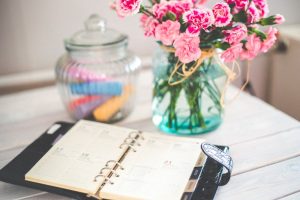When perimenopause symptoms start it can be hard to know what is happening. And difficult to know what to do for the best. I was talking with Judith a patient of mine from East Sussex, who has gone through perimenopause. I thought her responses were really insightful. So I asked her if we could share her experience to give others some insights and perimenopause advice.
Perimenopause Advice – A Case Study
1) What prompted you to take a natural approach to menopause?
I think it was because I was concerned about the health implications of HRT. It seems to be really difficult to get unbiased opinions on it. The drug companies have a vested interest in getting women on to HRT, which made me dubious about their claims. And even independent experts seemed to be only talking about the positive aspects and ignoring the side effects, etc.
I also had heard that it is difficult to come off HRT. When you do, you still have to go through the menopause. So it only seemed like it would postpone rather than solve the problem.
Also menopause to me isn’t an illness, it’s just a natural process your body is designed to go through so taking a treatment that is stopping that didn’t seem like a healthy approach.

2) What was the most challenging thing was about going through the menopause?
Feeling out of control of what is going on. I think most women know their bodies and their cycle well and get used to managing it. If you have PMT, you know that it will only last for a certain amount of time. With the menopause you have no idea of what is going on and you feel like it is going for ever! You really feel at the mercy of whatever your hormones are doing which means you often don’t feel like yourself.
3) What do you feel helped you the most?
Talking to you! It really helps to know someone understands what you are going through and can help explain what is going on. I think to be honest it’s very hard to know which elements helped the most. But I did feel better for taking the various remedies and herbs, and thinking about my diet more. It definitely made things more manageable.
4) What perimenopause advice would you give to women who are just starting to experience symptoms?
Start putting in place things that are going to help you when it gets harder. So start eating a healthy diet and exercising as they all helped. Try and be more aware of changes that are happening as they can be more gradual and subtle than you realise so you are better prepared. Definitely explore all the options open to you whether it’s HRT or alternative treatments.
5) What would you ay to women who are struggling with perimenopause?
Well it is really tough, but you just have to remember that it is not going to last for ever even if it feels like it! It’s really hard to believe that though when you are in the middle of it. Avoid all those women who say ‘Oh I just sailed through it, it was really easy’ and talk to those who found it difficult. It can be really tough, and I was definitely one of those who found it hard and couldn’t see an end.
I think I learned eventually to stop getting upset about feeling so rubbish and accept it was happening and that there would be an end at some point. Once I stopped railing against it, it got a bit easier. And as much as I didn’t want to take HRT I knew that was still an option if things got too difficult and just knowing that helps you keep going.
Learning to look after yourself physically and mentally is important as menopause affects you on every level. A chart to tick off the months you don’t have a period helps you feel like you are making progress! It’s not all plain sailing now though. I still have occasional symptoms, but they are so much less now and easier to cope with because I learnt how to deal with them.

6) What perimenopause advice would you share with the partners of women who are going through it?
I think it’s so difficult for men to understand the fact that your mood can change by the hour if not the minute! The best thing I think they can do is to not try and rationalise it. To accept there isn’t much they can do but understand it’s the hormones talking. And to distract you from thinking about it and give lots of hugs!
I used to try and pre-warn my partner if I felt like it was going to be a hormonal day. Then he could know what to expect and be prepared for the onslaught. That was often being supportive. But if he felt he needed a break, then he could say that and go and do something else for a bit without me feeling abandoned. As ever, communicating about it is far better.
I think the menopause makes you face up to the way you are dealing with your relationships. Working through that is not always easy. But you come out the other side with a better understanding of each other.

7) What strikes you as you look back over those years?
I don’t think I realised that actually the perimenopause had been going on longer than I thought. Now I’m at the other side I can see it was a gradual process that had crept up on me a bit. I wasn’t as ready as I should have been when it got tougher.
I’m really glad that I didn’t take HRT as I feel that I learnt so much more about myself from going through it and it’s taught me how to handle myself better, face up to issues I had been avoiding and what I need to do to keep myself healthy and happy.
You might think you should know yourself by this age but often women have spent the last 20 or 30 years of their lives looking after families. And haven’t really had time to focus on themselves. This is such a valuable time to do it so you are in a great position for the next stage of your life.
8) What do you wish you had known then that you know now?
That you will feel a lot better than you have probably felt for years! I can’t believe the energy levels I have now my body doesn’t have to cope with all the hormonal upheavals. And instead of feeling sad that that part of my life is over, I feel much freer from the constant cycle of ups and downs that hormones bring. It’s really liberating.
Thank you for your perimenopause advice!
Thank you to Judith for taking the time to do this in a busy life. I asked if we could write this because I think it is so helpful to hear about the experience of someone who has been there! And many of the women I see in clinic or at the self-help menopause workshops often appreciate this sharing of experience and find it to be very supportive.
There are so many aspects to perimenopause advice. You can find a lot of information in my Menopause Blogs. If you feel you would benefit from more support, I offer a free mini-consultation so you can see if my approach might suit you. Please do contact me – thank you.



